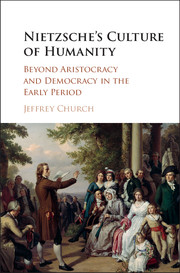Book contents
- Frontmatter
- Dedication
- Contents
- Preface
- List of abbreviations
- Introduction
- PART I The Foundation of Culture in the Early Nietzsche
- Part II Two Concepts of Culture in the Early Nietzsche
- PART III The Means to Culture in the Early Nietzsche
- PART IV The Significance of the Early Period
- 9 From Nietzsche's Early to His Late Period
- 10 Culture as Identity, Culture as Individuals
- Bibliography
- Index
10 - Culture as Identity, Culture as Individuals
from PART IV - The Significance of the Early Period
Published online by Cambridge University Press: 05 October 2015
- Frontmatter
- Dedication
- Contents
- Preface
- List of abbreviations
- Introduction
- PART I The Foundation of Culture in the Early Nietzsche
- Part II Two Concepts of Culture in the Early Nietzsche
- PART III The Means to Culture in the Early Nietzsche
- PART IV The Significance of the Early Period
- 9 From Nietzsche's Early to His Late Period
- 10 Culture as Identity, Culture as Individuals
- Bibliography
- Index
Summary
This has not only been a book about Nietzsche for Nietzsche scholars. I have also reconstructed Nietzsche's view so that it can speak to contemporary political theory. In this concluding chapter, I draw on my previous discussion to highlight one important contribution of Nietzsche's theory of culture: His view of culture as “individuals” represents a powerful rival to our contemporary view of culture as “identity.” Contemporary political theorists encounter two problems in conceiving of culture in terms of “identity.” On the one hand, identities are fluid and changeable, and so not a solid foundation for the integrity of culture; on the other hand, identities divide cultures rather than bringing them together. Nietzsche's novel defense of culture can overcome these problems. Whereas identities come and go, exemplary individuals remain the same, bringing permanence and integrity to a people. Whereas identities divide cultures, exemplary individuals, as representatives of humanity as a whole, bring them together.
CONTEMPORARY POLITICAL THEORY OF CULTURE
According to ancient thinkers such as Plato and Aristotle, the purpose of political community is to foster the good life for human beings. As such, ancient political philosophy began with the ethical question of what is the best life. Armed with the understanding of the good life, then, ancient thinkers could search for the right social and political conditions to foster that life – the best regime. Modern political philosophers, however, began at a different starting point, having rejected the ancients’ notion of a single summum bonum. Late modern thinkers such as Herder and Nietzsche accepted this critique of a single best life and a single best regime. However, they parted from early modern philosophers in defending the ancient notion of community, that the best community is the one that fosters the good life for human beings. What distinguished these thinkers is that, for them, there is no single best culture, but many, as there is no single best life, but many. This distinctive feature of the concept of culture is eminently familiar to us. When we contemporaries employ the word “culture,” we sidestep the ancient normative question of the best regime. When we discuss “cultures,” we implicitly assume that these communities cannot be ranked, but are in some fundamental way incommensurable.
- Type
- Chapter
- Information
- Nietzsche's Culture of HumanityBeyond Aristocracy and Democracy in the Early Period, pp. 246 - 255Publisher: Cambridge University PressPrint publication year: 2015

